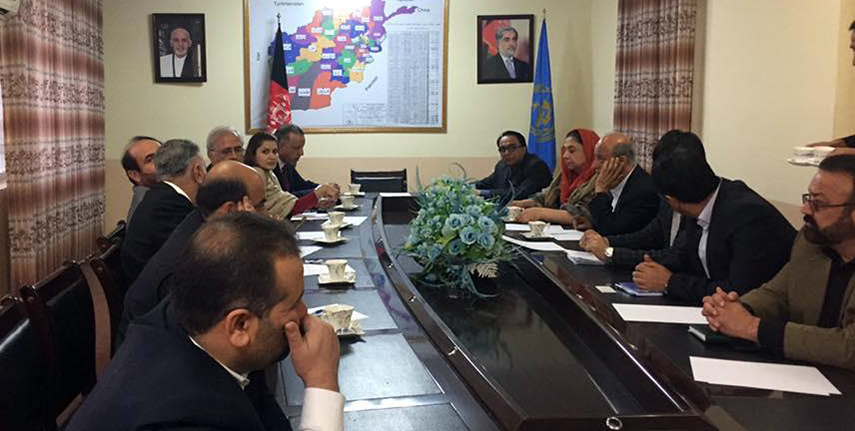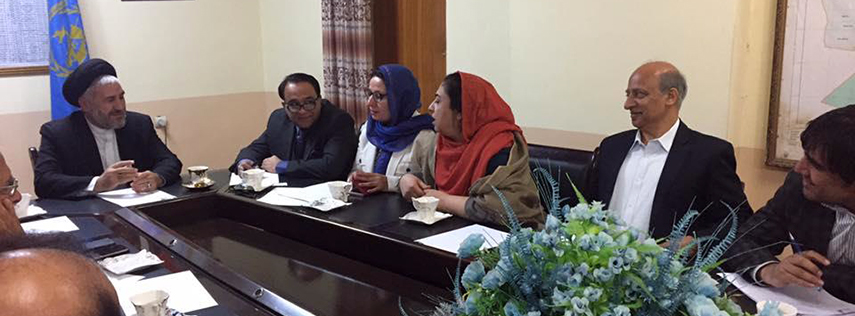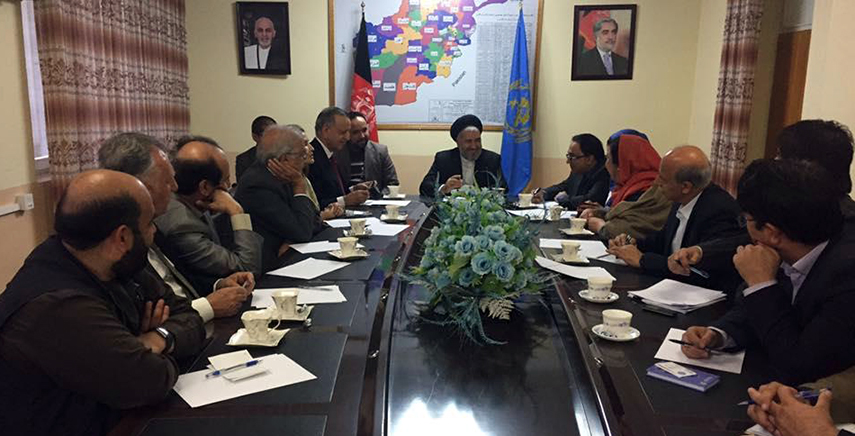The CRSS-WPSO track II Beyond Boundaries project’s Pakistan Afghanistan Joint Committee (PAJC) members from both the countries met with the Minister of Refugee and Repatriation, S. Hossain Alemi Balkhi on Wednesday 16 November, 2016, at his office.
The Pakistani side comprised Dr. Shoaib Suddle, former IG Police and federal tax ombudsman; Shazia Marri, Member of Parliament; Qazi Humayun, former ambassador; Mian Sanaullah, former ambassador; and Tahir Khan, senior journalist. The Afghanistan side included Khalid Pashtoon, Member of Parliament; Elay Ershad, Member of Parliament; Sayed Qutbudin Roydar, former deputy minister for parliamentary affairs; Mozammil Shinwari, former deputy minister for trade & commerce; Abdul Hakeem Mujahid, head of executive council of the High Peace Council; Palwasha Hassan, civil society leader; and Bilal Sarwary, senior journalist.
The meeting was held in a very positive, cordial atmosphere with frank and candid exchange of views. The Minister thanked and welcomed the two delegations and organizers of the track II initiative. He greatly appreciated Pakistan for the kind of hospitality they have provided to Afghan refugees for almost forty years.
WPSO representative Asila Wardak introduced the two delegations of PAJC as well as the representatives of CRSS. Afghan member of PAJC, Palwasha Hassan gave a rundown of the project and the two meetings of PAJC held so far including the recent one in Mazar-e-Sharif on 14 November, 2016, where core issues of peace and security, refugees, trade, education and scholarship programmes, Pakistan funded projects in Afghanistan, and Media, Arts and Culture were discussed. She also briefed the minister on the PAJC meeting with the federal minister of Pakistan for States and Frontier Regions (SAFRON), Gen. Abdul Qadir Baloch, and the positive response and feedback that came from the meeting. Mr. Balkhi said: “I welcome the delegations and thank you all; the issues that you have been discussing peace, education, refugees and others are really important for us to work together”.
Qazi Humayun from the Pakistan side gave the point of view of the Pakistan delegation and most Pakistani people on the Afghan refugee issue, particularly describing as unfortunate the recent episode of Sharbat Gula.
Minister Balkhi noted that the initiative of CRSS-WPSO and groups is very important and imperative to keep the dialogue for peaceful bilateral relations through such high level civil society engagement. He gave a detailed account of his government’s views and policies:
“Afghanistan and Pakistan have a long relationship; they need each other for peaceful relations. Whenever I traveled to Pakistan, and met with Prime Minister Sharif, Sartaj Aziz, Abdul Qadir Baloch and other ministers, I conveyed to them our friendship is very important to us, but, we should not forget we have enemies. I am grateful to Pakistan for the great hospitality they have extended over the last four decades to the Afghan refugees, which should not be destroyed when we are coming to an end. We have 2.5 million refugees in Pakistan, this year six hundred thousand of those have returned. I feel they should come back with good memories of hospitality and Pakistani generosity, they should not be returning with heavy hearts and bad feelings. We have been in contact with SAFRON for the last two years, several meetings were held here and in Pakistan, and we requested them to extend the repatriation deadline to 2017. In my view refugees are a common asset and a bond between us – it should not be used as a breaking point – let’s not make refuges the scapegoat for instability and political problems between the two countries.”
Balkhi pointed out that the agreement between Afghanistan and Pakistan was extended to two years at the start of this year, but, unfortunately within six months the refugees were forced to leave. He noted that political tensions between the two countries were perhaps applied by Pakistan to deal with refugees; we requested to Pakistan authorities that refugees issue should be dealt on humanitarian grounds, and should not be coupled or grouped with security and terrorism. He further added that for the unregistered refugees there existed a Pak-Afghan agreement, whereby they also set up a budget for registration process; unfortunately this was not implemented.
Minister Balkhi said he was happy to note that in the Brussels conference, Pakistan has again dedicated US $ 500 million, which is a courtesy of their continued support to development of Afghanistan. “I want to again emphasize that our foreign policy is to have brotherly and friendly relations with Pakistan, more so than any other country. Therefore, it is important that we identify spoiler factors, we also have to remain sensitive about refugees so it does not harm that relationship”, he added.
Balkhi said that the role of media has not been positive on both sides, and that we should not go by what the media always reports as sometimes it reflects vested interests; even though there is freedom of media in both countries. “We should not be held hostage to media reporting and should continue positive and peaceful relations”, he expressed. He called the repatriation of unregistered refugees as short sighted and felt that it was influenced by media, noting that these issues should not be dictated by media. Minister Balkhi said: “I am thankful to SAFRON ministry, their approach had been very good, they had reached agreement with us for 2017, but, may be other ministries like Ministry of Interior played a role not to honor the agreement based on media reports. Let’s be very frank about Pakistan-Afghanistan-India relations. In my view we will never give preference to India over Pakistan. But, nevertheless, as we need support for reconstruction, and India has helped with many large scale projects. But, it does not mean that we do not appreciate the Pakistan projects”.
Shoaib Suddle from Pakistan side spoke on behalf of the delegation, stating: “we are impressed by what you have said and we take back a very positive feeling. We are entirely in agreement with you that refugees are our assets and we should not spoil at the end; refugees are indeed the best bond that we have with each other. We have no issues with your relationship with India, as long as Afghanistan soil is not used for interfering in Pakistan. What you have stated is very reassuring and we as Pakistani group greatly appreciate it”.
At the end of the meeting, Shoaib Suddle shared and presented the policy recommendations of both PAJC groups from the meeting held at Mazar-e-Sharif.



